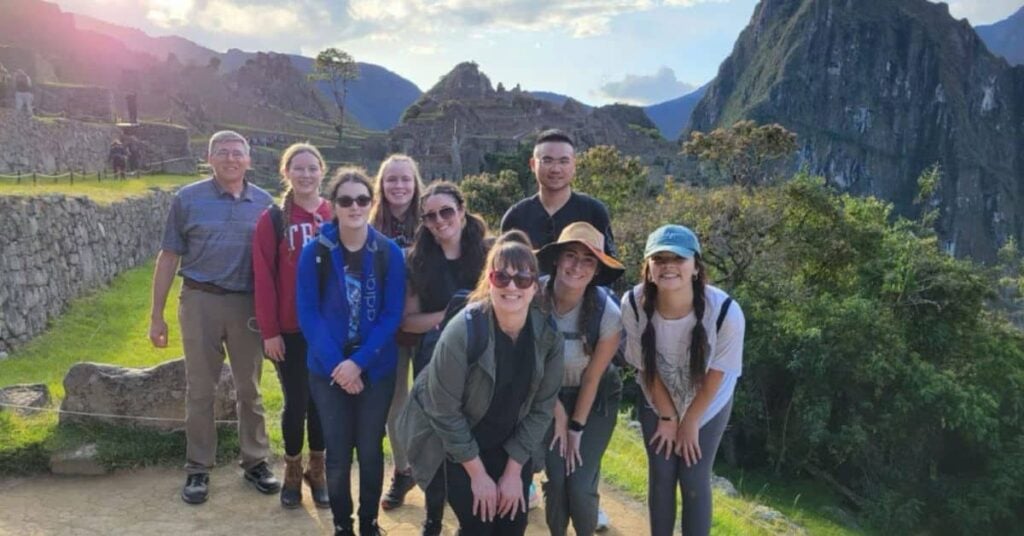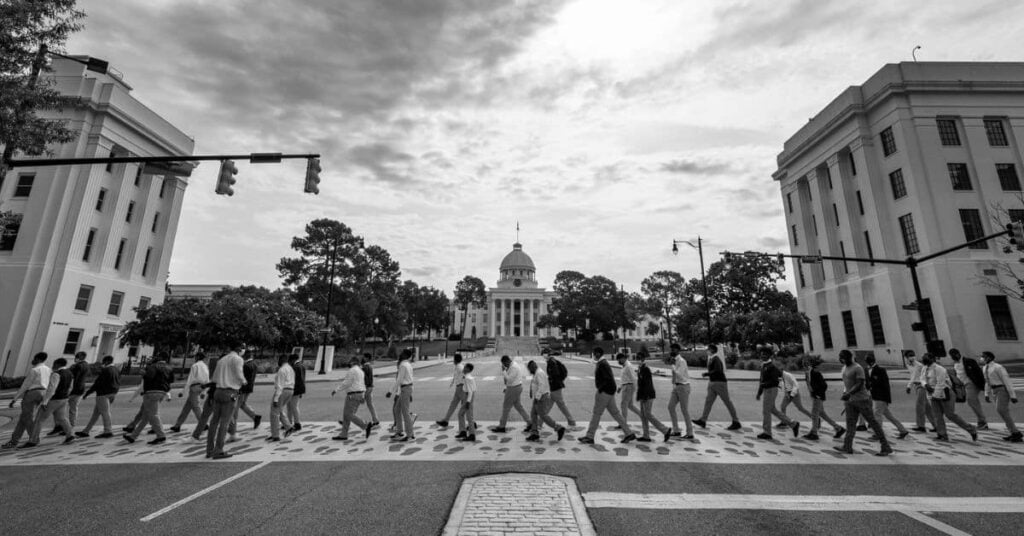Oct. 18, 2022
Nearly 250 Troy University students took to the skies and traveled to 15 different countries during the 2021-2022 academic year after the resurgence of study abroad opportunities, thanks in large part to the Chancellor’s Award for Global Competitiveness (CAGC).
The Chancellor’s Award aims to foster international awareness and better assimilation of Troy University students in the worldwide work place while providing the financial assistance to make that goal a reality.
Sarah McKenzie, Study Abroad Coordinator, said the scholarship has grown over the last few years from $500, to $750, to $1,000 to the current $1,250 offering. “It increased because it’s an important initiative to the Chancellor. He and his administration want to make it as easy as possible and incentivize students to go,” she said. “On average, most of our trips cost around $3,000, so $1,250 knocks off a third of that cost. It still sounds like a lot, but no one is going to give you that opportunity at that price once you leave TROY. Chancellor Hawkins wants everyone to have the opportunity to go if they want to.”
The CAGC is open to all TROY students, both undergraduate, graduate and online, who have successfully completed one full semester at TROY, are registered full time, are in good academic standing, possess a minimum overall GPA of 2.5 and have completed the TroyAbroad application, which includes the CAGC forms. “It’s non-competitive except for those criteria, so if you meet the requirements and apply, you get the award,” McKenzie said.
Over the 2021-2022 academic year, 245 students took advantage of the 14 faculty-led trips to 15 different locations. Of the 245 students who traveled, four participated in three-week summer programs while five opted for a semester-long exchange. The TROY men’s basketball team also traveled to Costa Rica for eight days and competed against the El Salvador National Team and the Costa Rica All-Stars, in addition to many team bonding activities and hosting kids’ basketball clinics. Additional travel spots included Puerto Rico, Italy, Ecuador, Switzerland, France, London, the Galapagos, Greece, the United Kingdom, Ireland, Peru, Paris, Pietrasanta and the Digging Vada archaeological site in Tuscany.
Dr. Jay Valentine, Associate Professor of history, took a group of 30 TROY students and 10 adults to Paris in June. The associated class, philosophy of art, focused on art aesthetics and art theory. “We did this study focus because you’re able to enjoy art much more and appreciate it for what it is when you have some background knowledge,” he said. “So not only did it enrich our experience of museums, but also just walking around in Paris. Parisians are very conscious of aesthetics in general, so everything is kind of an art project—from street art to murals to how the city is orchestrated.”
In addition to exploring the Louvre, countless other art museums and the city streets, Valentine said his group immersed themselves in the culture as much as possible while also battling record-setting temperatures. “Experiencing different cultures is an important part of someone’s mental and individual development. Some of the students really embraced it and went out and ate snails and all that and really engaged the culture,” he said. “We had some days where it was just brutal out there, but you have this itinerary of all these places to go so you just have to keep on and try your best to fight through it. Those things build resilience, but it helps to amplify the experience as well. It makes it special in a way.”
Valentine also led a group to India in 2017 and Nepal in 2019. During Spring Break of 2023, he’ll lead yet another group, this time to Costa Rica. He believes students being able to experience a culture different from their own is vital to personal growth. “It’s very healthy for students to experience a culture that is fundamentally different from their own. Not opposed or against, just different from,” he said. “Not only does it help you understand the world a little better, it also helps you understand your own culture more as well. It can also be a major confidence boost for a lot of students to see that they can do this, they can make the payments, do what needs to be done to go and then get the reward of going. It breaks the seal on the world of traveling once you’ve ripped off the bandage or left your safe spot.”
Alaina Burnham, a sophomore global business major with a concentration in entrepreneurship from Madison, Alabama, traveled to Ecuador in April and Peru in May. The trip to Ecuador, through the Sorrell College of Business’ Sorrell Society of Global Scholars, focused on working in micro-industry factories. Burnham worked at both a chocolate factory and a fruit-drying factory over a five-day period. “The first day I went through the entire process of making a kind of toffee, an Ecuadorian delicacy that’s more of an acquired taste. The second day, I realized why people don’t recommend factory work because I spent the entire morning separating cocoa beans,” she said. “Because I’m a business major, I was looking at it from a slightly different perspective and I got to see ways they could make improvements. It was really quite the experience and helped me understand, as a potential manager in the future, how I should treat my employees and get in their shoes to see what the day-to-day is like.”
Outside of experiencing factory work, the group also toured the capital, visited the equator and received top-notch treatment from the owner of their hostel. “The owner actually cooked us our breakfast and dinner meals every day, so we were able to have even more authentic food since it was cooked by a local,” she said. “She did cook us more American cuisine once or twice, which was pretty fun.”
Burnham received a Spanish course credit for the Peru trip through the Center for International Languages and Cultures and called it a “dream come true” after being able to experience Machu Pichu with her father. “When I heard there was a possibility Machu Pichu may be closing to the public in the next few years due to how tourists have harmed the ruins, I jumped on the opportunity to go,” she said. “My dad actually came with me on this trip, so seeing that and learning about the ruins and the history with him was an incredible experience. It’s been my dream since elementary school to see it.”
No matter the age, Burnham encouraged all students who are able to travel abroad to take the plunge and go for it. “Even if you’re young, you can still study abroad,” she said. “Studying abroad really opened my eyes and helped me realize that even though we’re people from different places, we’re all one. We all come from families and have traditions and that there’s beauty in everything.”
McKenzie offered another reason for students to consider study abroad: making your resume stand out. “Even if they only go for two weeks, students put that on their resume or in their cover letters and it really does increase their chance of getting a job post-graduation faster or getting into their grad school of choice,” she said. “Employers are looking for that. A high GPA and a degree aren’t enough anymore. You have to have something that sets you apart. It doesn’t have to be study abroad, but study abroad is a great choice that’ll give you a great experience.”
If you have exciting news to share with the Central Alabama business community, send your press releases (and high-quality images) to [email protected].






